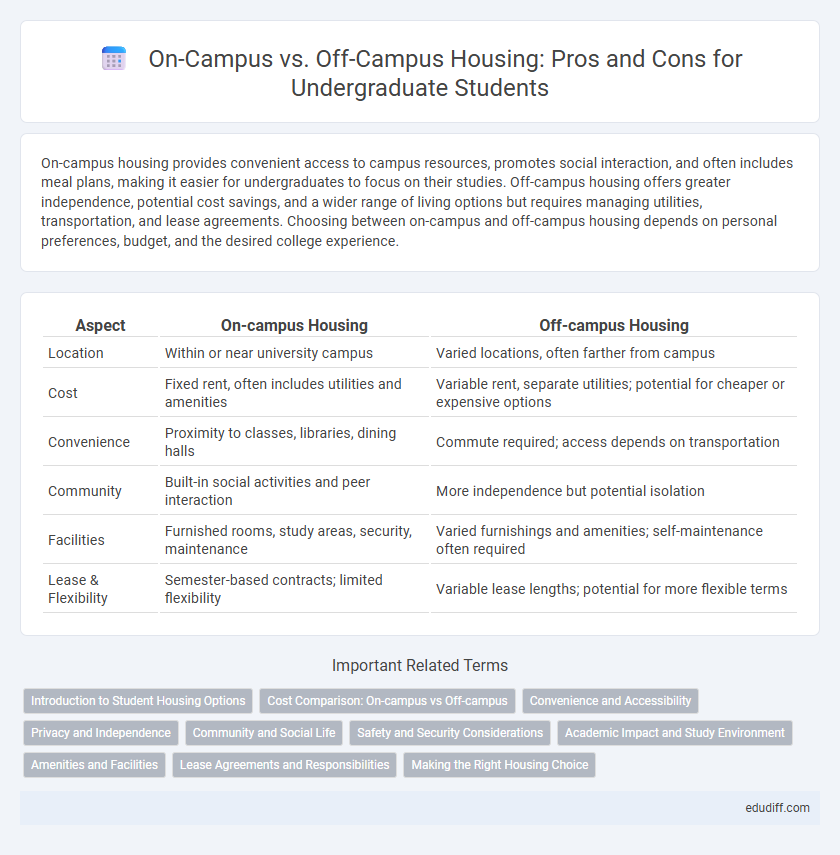On-campus housing provides convenient access to campus resources, promotes social interaction, and often includes meal plans, making it easier for undergraduates to focus on their studies. Off-campus housing offers greater independence, potential cost savings, and a wider range of living options but requires managing utilities, transportation, and lease agreements. Choosing between on-campus and off-campus housing depends on personal preferences, budget, and the desired college experience.
Table of Comparison
| Aspect | On-campus Housing | Off-campus Housing |
|---|---|---|
| Location | Within or near university campus | Varied locations, often farther from campus |
| Cost | Fixed rent, often includes utilities and amenities | Variable rent, separate utilities; potential for cheaper or expensive options |
| Convenience | Proximity to classes, libraries, dining halls | Commute required; access depends on transportation |
| Community | Built-in social activities and peer interaction | More independence but potential isolation |
| Facilities | Furnished rooms, study areas, security, maintenance | Varied furnishings and amenities; self-maintenance often required |
| Lease & Flexibility | Semester-based contracts; limited flexibility | Variable lease lengths; potential for more flexible terms |
Introduction to Student Housing Options
Undergraduate students choosing between on-campus and off-campus housing must consider factors such as cost, convenience, and social opportunities. On-campus housing often provides proximity to classes, campus resources, and organized community events, fostering engagement and ease of access. Off-campus housing offers greater independence, potential cost savings, and the ability to choose living arrangements tailored to personal preferences and lifestyle.
Cost Comparison: On-campus vs Off-campus
On-campus housing typically includes utilities, internet, and meal plans bundled into a fixed monthly cost, averaging $8,000 to $12,000 per academic year. Off-campus housing costs vary widely depending on location, with average rent ranging from $700 to $1,200 per month plus additional expenses for utilities, groceries, and transportation. Students often find off-campus housing can be more affordable overall, especially when sharing expenses with roommates, but on-campus housing provides predictable budgeting without hidden fees.
Convenience and Accessibility
On-campus housing offers unparalleled convenience with immediate access to academic buildings, libraries, and campus resources, reducing commute time significantly for undergraduate students. Off-campus housing may provide more privacy and variety but often requires reliance on transportation options, which can impact punctuality and participation in campus events. Proximity to campus amenities and ease of access critically influence daily routines and academic performance for undergraduates.
Privacy and Independence
On-campus housing provides structured privacy with residence hall rules and shared living spaces, which may limit personal independence. Off-campus housing offers greater control over living arrangements, allowing students to establish customized routines and enjoy enhanced privacy. Choosing off-campus options often results in increased responsibility for managing household tasks and navigating local amenities independently.
Community and Social Life
On-campus housing fosters a vibrant community atmosphere with easy access to student events, study groups, and social activities that encourage interaction and networking among undergraduates. Off-campus housing offers greater independence but often lacks the built-in social opportunities and communal spaces that promote spontaneous connections and a sense of belonging. Choosing on-campus residence enhances engagement in campus traditions and facilitates integration into the university social fabric, which can positively impact academic success and personal development.
Safety and Security Considerations
On-campus housing typically offers enhanced safety features such as secured entry points, 24/7 campus security patrols, and emergency response systems tailored to student needs. Off-campus housing safety can vary significantly, often requiring students to independently assess neighborhood crime rates, lighting, and proximity to emergency services. Prioritizing accommodations with verified security measures and accessible campus police resources is critical for undergraduate students' well-being.
Academic Impact and Study Environment
On-campus housing offers immediate access to campus libraries, study lounges, and academic resources, fostering a focused study environment that supports higher academic performance. Off-campus housing may provide fewer direct academic amenities but often encourages independent time management and quieter personal study spaces. Proximity to campus facilities in on-campus housing enhances collaboration opportunities with peers and faculty, positively impacting academic engagement.
Amenities and Facilities
On-campus housing typically offers convenient access to essential amenities such as study lounges, fitness centers, and meal plans, enhancing the student living experience. Off-campus housing may provide more spacious living arrangements and privacy but often requires students to independently manage utilities, transportation, and grocery shopping. Comparing facilities, on-campus options prioritize community engagement and security features, while off-campus housing can vary widely in amenities based on location and cost.
Lease Agreements and Responsibilities
On-campus housing lease agreements typically span the academic year with standardized terms managed by the university, ensuring consistent maintenance and security services. Off-campus leases vary widely, often requiring students to negotiate terms directly with landlords, which may include responsibilities like utility payments, repairs, and renters insurance. Understanding the specifics of lease duration, deposit requirements, and maintenance obligations is crucial for students to avoid legal issues and financial penalties.
Making the Right Housing Choice
Choosing between on-campus and off-campus housing significantly affects an undergraduate's academic performance, social life, and financial budget. On-campus housing offers convenience with proximity to classes, campus facilities, and structured social activities, while off-campus housing provides greater independence, potential cost savings, and a wider selection of living options. Evaluating factors such as commute time, rental costs, campus involvement opportunities, and personal lifestyle preferences is essential for making the right housing choice.
On-campus Housing vs Off-campus Housing Infographic

 edudiff.com
edudiff.com